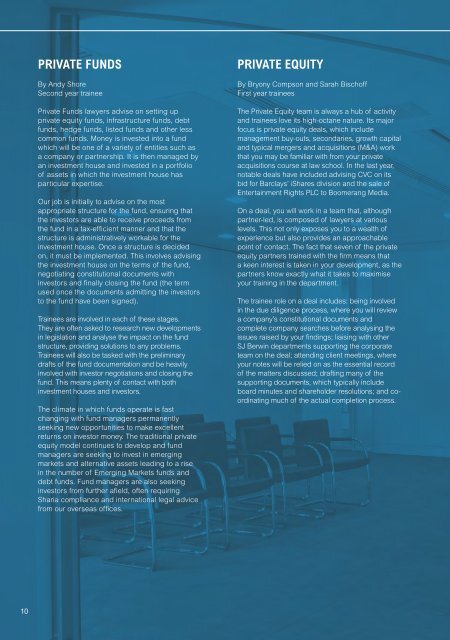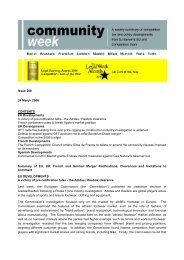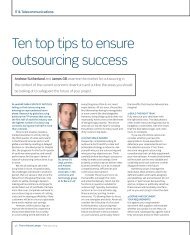SJ Berwin - PLUM 2009
SJ Berwin - PLUM 2009
SJ Berwin - PLUM 2009
- TAGS
- berwin
- plum
- www.sjberwin.com
Create successful ePaper yourself
Turn your PDF publications into a flip-book with our unique Google optimized e-Paper software.
10<br />
PRIVATE FUNDS<br />
By Andy Shore<br />
Second year trainee<br />
Private Funds lawyers advise on setting up<br />
private equity funds, infrastructure funds, debt<br />
funds, hedge funds, listed funds and other less<br />
common funds. Money is invested into a fund<br />
which will be one of a variety of entities such as<br />
a company or partnership. It is then managed by<br />
an investment house and invested in a portfolio<br />
of assets in which the investment house has<br />
particular expertise.<br />
Our job is initially to advise on the most<br />
appropriate structure for the fund, ensuring that<br />
the investors are able to receive proceeds from<br />
the fund in a tax-efficient manner and that the<br />
structure is administratively workable for the<br />
investment house. Once a structure is decided<br />
on, it must be implemented. This involves advising<br />
the investment house on the terms of the fund,<br />
negotiating constitutional documents with<br />
investors and finally closing the fund (the term<br />
used once the documents admitting the investors<br />
to the fund have been signed).<br />
Trainees are involved in each of these stages.<br />
They are often asked to research new developments<br />
in legislation and analyse the impact on the fund<br />
structure, providing solutions to any problems.<br />
Trainees will also be tasked with the preliminary<br />
drafts of the fund documentation and be heavily<br />
involved with investor negotiations and closing the<br />
fund. This means plenty of contact with both<br />
investment houses and investors.<br />
The climate in which funds operate is fast<br />
changing with fund managers permanently<br />
seeking new opportunities to make excellent<br />
returns on investor money. The traditional private<br />
equity model continues to develop and fund<br />
managers are seeking to invest in emerging<br />
markets and alternative assets leading to a rise<br />
in the number of Emerging Markets funds and<br />
debt funds. Fund managers are also seeking<br />
investors from further afield, often requiring<br />
Sharia compliance and international legal advice<br />
from our overseas offices.<br />
PRIVATE EQUITY<br />
By Bryony Compson and Sarah Bischoff<br />
First year trainees<br />
The Private Equity team is always a hub of activity<br />
and trainees love its high-octane nature. Its major<br />
focus is private equity deals, which include<br />
management buy-outs, secondaries, growth capital<br />
and typical mergers and acquisitions (M&A) work<br />
that you may be familiar with from your private<br />
acquisitions course at law school. In the last year,<br />
notable deals have included advising CVC on its<br />
bid for Barclays’ iShares division and the sale of<br />
Entertainment Rights PLC to Boomerang Media.<br />
On a deal, you will work in a team that, although<br />
partner-led, is composed of lawyers at various<br />
levels. This not only exposes you to a wealth of<br />
experience but also provides an approachable<br />
point of contact. The fact that seven of the private<br />
equity partners trained with the firm means that<br />
a keen interest is taken in your development, as the<br />
partners know exactly what it takes to maximise<br />
your training in the department.<br />
The trainee role on a deal includes: being involved<br />
in the due diligence process, where you will review<br />
a company’s constitutional documents and<br />
complete company searches before analysing the<br />
issues raised by your findings; liaising with other<br />
<strong>SJ</strong> <strong>Berwin</strong> departments supporting the corporate<br />
team on the deal; attending client meetings, where<br />
your notes will be relied on as the essential record<br />
of the matters discussed; drafting many of the<br />
supporting documents, which typically include<br />
board minutes and shareholder resolutions; and coordinating<br />
much of the actual completion process.













